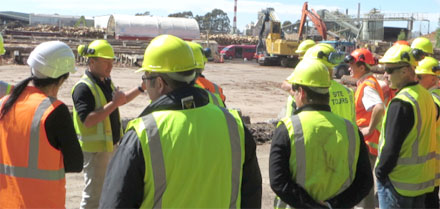
A global demand for logs and competition for workers in primary industries have left Northland with an acute shortage of labourers in the forestry sector- a situation that may delay planting and harvesting of trees. Sources: New Zealand Herald, Northern Advocate
At least 50 workers to perform a variety of jobs such as machine operators, planting, and tree pruning across the region are needed immediately and some forestry contractors are already looking to hire from the Pacific Islands and Philippines.
Forestry contractors began experiencing the shortage two years ago but it has now become dire.
Kevin Ihaka, owner of Forest Protection Services in Whangarei which does planting and pruning of mostly pine forests on behalf of forest owners throughout Northland, has just placed a job advertisement for 15 more workers.
He said the situation was critical for contractors as a lot of trees were ready to be harvested.
“The export price for logs is good so the forestry industry is in good shape. The demand for logs looks like it will hang around for a number of years but we can’t get workers.
“We can take people without any skills and train them and when you look at the number of people who are unemployed in Northland, forestry work is something they can do.”
Mr Ihaka, who is on the Forest Industry Contractors Association board, said labour shortage was more prevalent in Northland and Gisborne and he feared jobs such as planting and harvesting may not get done or could be delayed if more people were not recruited on time.
Part of the reason people lost interest in forestry work, he said, was because some contractors did not treat their staff well in the past which gave the sector a bad name.
But he said employment laws have since toughened and work conditions have become safer after the introduction of mechanical harvesters which should entice Northlanders to consider forestry as a long-term career.
Compulsory alcohol and drug testing either put people off from applying for roles in the forestry sector or they left employment but Mr Ihaka said workers were changing their habits because of job security.
According to the Ministry for Primary Industries, Northland had 131,333ha of forest area in which radiata pine, douglas fir, cypress, other softwood, eucalypt, and other hardwood were grown as at April 1, 2016.
OneForest has advertised for proposal to harvest 70,000 tonnes of trees in Broadwood, 48km southeast of Kaitaia, from July and company director Des Minehan said forest contractors needed to train and educate locals so they stayed in the job for long.
The company opened an office in Kaitaia two years and ago works with small forest growers of between 20 and 100 hectare blocks throughout Northland.
“One of the problems in attracting and retaining workers in the forestry sector in Northland is a lack of training and ongoing education. There’s a lot of overseas companies that are perhaps not giving back to the local community,” he said.
“We have enrolled 17 young people from Muriwhenua Corporation in Kaitaia in forestry courses through NorthTec so we want to train locals so they can own logging crews and be successful,” he said.
John Stulen, president of the Forest Industry Contractors Association, said labour shortages were more prevalent in Northland and the East Coast.
“Wood demand is very hard so the forestry workforce needs to grow by 10% to 20%. There’s also competition from the likes of the horticulture industry and a perception among people that forestry work is quite hard work,” he said.
Mr Stulen said drug testing may put people off from applying but they needed to realise they could make a long-term career in forestry.





